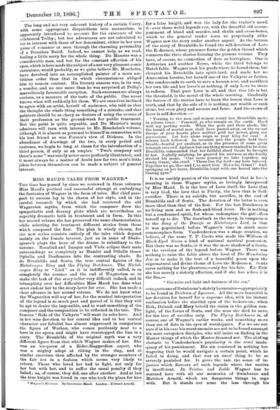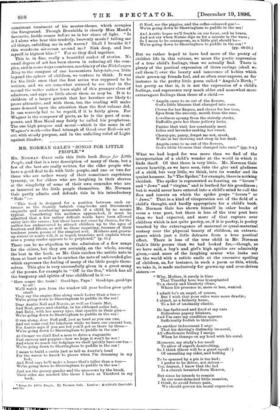MISS MAUD'S TALES FROM WAGNER.*
THE time has passed by since we reviewed in these columns Miss Maud's poetical and successful attempt at embodying the fantasies of Wagner in the form of tales. Her chief pass- port to success lay in the charm of her style, and in the careful research by which she had mastered the old Wagnerian myths, from which the composer drew the sympathetic and dreamy plots which are nevertheless BO superbly dramatic both in treatment and in form. In this her second volume she has preserved the same characteristics, while selecting for treatment different stories from those which composed the first. The plan is wisely chosen, for the new series consists entirely of the tales which depend mainly on the female interest, just as in some of Shake- speare's plays the hero of the drama is subsidiary to the heroine. Rosalind and Imogen and Viola eclipse their male surroundings as completely as Hamlet and Othello throw Ophelia and Desdemona into the contrasting shade. So do Brunhilda and Senta, the true central figures of the Niebelungen Bing and the Flying Dutchman. The Niebel- ungen Bing or "Lied" as it is indifferently called, is so completely the essence and the end of Wagnerism as to make the task of the story-teller very difficult indeed, and in triumphing over her difficulties Miss Maud has done what must endear her to the story-lover for ever. She has made a clear advance in her second volume. We do not know what the Wagnerites will say of her, for the musical interpretation of the legend is so much part and pared of it that they will be apt to desire the impossible, and to want something of the composer and the composition to be reflected in the tale. The famous "Ride of the Valkyrie" will want its echo here. And in her wise devotion to her central idea and to her central character our fabulist has almost suppressed in comparison the figure of Wothan, who comes perilously near to a bore in the opera, and might have overstepped the line in a story. The Branhilda of the original myth was a very different figure from that which Wagner makes of her. She was an ice-queen of a Rider-Haggardian aspect, who was a mighty adept at tilting in the ring, and at similar exercises then affected by the stronger members of the fair sex in a fashion which seems very likely to return. Those who loved her had to fight, not only for her but with her, and to suffer the usual penalty if they failed; as, of coarse, they did, one after another. And at last the true knight was found in one who took the place for hire • Waver's Heroines. By Constance Maud. London : Elward Arnold.
for a false knight, and won the lady for the traitor's meed. So ever those weird legends run, with the dreadful old accom- paniment of blood and murder, and skulls and cross-bones, which to the general reader seem so perpetually alike.
Wagner saw the story under another aspect. At the bottom of the story of Brunhilda he found the self-devotion of Love the Redeemer, whose presence forms the golden thread which connects the three stories forming the present volume. They have, of course, no connection of date or birthplace. One is Arthurian and another Norse, while the third belongs to Dutch fable. Wagner took his goods where he found them, but elevated his Brunhilda into spirit-land, and made her no Amazonian heroine, but herself one of the Valkyrie or fairies, who condescends to earth to save a human soul, and sacrifices her own life and her lover's as nothing, if only Love be there to redeem. That pure Love is all, and that this life is but the threshold, is the moral of the whole teaching. Gradually the heroes of the stories have to learn the lesson that Love is truth, and that by the side of it is nothing, not wealth or rank alone, but even glory and success and fame. And the crown of Love is self-devotion :—
"Turning to the men and women round her, Brunhilda spoke in solemn tones : Farewell, ye who remain on the earth. Heed well my parting words. When the gods and their abode, like the breath of mortal man, shall have passed away, on the vacant throne of your hearts place neither gold nor power, glory nor possessions. Let love alone reign as your king for ever.' A solemn hush followed. In reverent awe the people held their breath—fearful yet exultant, as in the presence of some great triumph over evil. And now but one thing more remained to be done. Brunhilda commanded that her faithful steed Grani be brought to her. Joyfully neighing, he greeted his mistress as she fondly stroked his mane. One more journey we take together, my trusty Grata,' she cried. There lies thy lord—my hero beloved. Together we go, thee and I, to meet him. Hei-a-ho, Grath ! ' And, springing on her horse, Brunhilda leapt with one bound into the blazing pyre."
It is no earthly passion of the common kind that is love's
meaning in these Wagner myths, so lovingly interpreted by Miss Maud. It is the love of Love itself, the Love that is very God, the love that is Purity, the love that is Self- sacrifice. There is no suicide, but sacrifice, in the end of Brunhilda and of Senta. The devotion of the latter is even more ideal than that of the first. For the lost Dutchman is no living man and no flesh-and-blood lover. He is nothing but a condemned spirit, for whose redemption the girl offers herself up to die. The drawback to the story, in comparison to the Song of the Dwarfs or Niebelungen Lied, is that it was popularised before Wagner's time in much more commonplace form. Vanderdecken was a stage creation, we believe, of the same T. P. Cooke who made the William of Black-Eyed Susan a kind of national nautical possession. Bat there was no Senta, or it was the mere shadow of a Senta, in the versions of the legend before Wagner. There was nothing to raise the fable above the level of The Wandering Jew or to make it the text of a beautiful poem upon the supernatural and divine theme of Love the Redeemtr. Senta cares nothing for the phantom,—only for his fate. For Erik she has merely a sisterly affection, and if she has a love it is the Sea,—
" the noise and light and darkness of the sea," —to q note one of S winburne's stately harmonies—appropriately to be found in Tristram of Lyonesse. All the more beautiful is her devotion for herself for a supreme idea, with its instant realisation before the startled eyes of the lookers-on ; when
Erik, Daland, and Mary beheld the vision in the golden sun- light, of the forms of Senta, and the man she died to save, for the love of sacrifice only. The Flying Dutchman is, of coarse, one of Wagner's earlier works, and something more than out of date in the eyes of worshippers. For we are not sure if in his case his worst enemies are not to be found amongst his most outspoken disciples, who will insist on finding in the Master things of which the Master dreamed not. The abiding obstacle to Vanderdecken's popularity is the cruel inade- quacy of his punishment. His sin consisted in nothing but
wagering that he would navigate a certain point, which he failed in doing, and that was an unco' thing to be so severely punished for. It gives the tale the sense of in. justice which flavours all such legends where the motive
is insufficient In Tristan and Isolde Wagner has to contend here with all our memories of Swinbarne and. Matthew Arnold, which are dangerous things to cope with. But it stands out none the less through his consistent treatment of his master-theme, which occupies the foreground. Though Brunhilda is clearly Miss Maud's favourite, Isolde comes before us in her share of light. "Is it I alone who hear this tenderly, heavenly music ? telling me all things, enfolding me in soft waves ? Shall I breathe it ? this wondrous air-ocean around me? Sink deep, and lose myself in highest bliss ? " For so they died together.
This is, in fine, really a beautiful casket of stories. No small degree of art has been shown in reducing all the com- plex, and in some ways cumbrous, machinery of the Niebelungen Bing to the compass of one harmonious fairy-tale,—a little beyond the sphere of children, we venture to think. It was for the little ones that the first series was supposed to be written, and we are somewhat amused to see that in the second the writer rather loses sight of this younger class of admirers, and says as little about them as may be. It is to children of a larger growth that her heroines are likely to prove attractive, and with them, too, the reading will make more demand upon the attention than the first volume did. It can scarcely fail to be repaid, if it is fairly given. For Wagner is the composer of poets, as he is the poet of com- posers, and Miss Maud may fairly be called his prophetess. The one high purpose and moral—which is the same in all Wagner's work—the final triumph of Good over Evil—is set out with steady purpose, and in the unfailing relief of Light against Shadow.











































 Previous page
Previous page